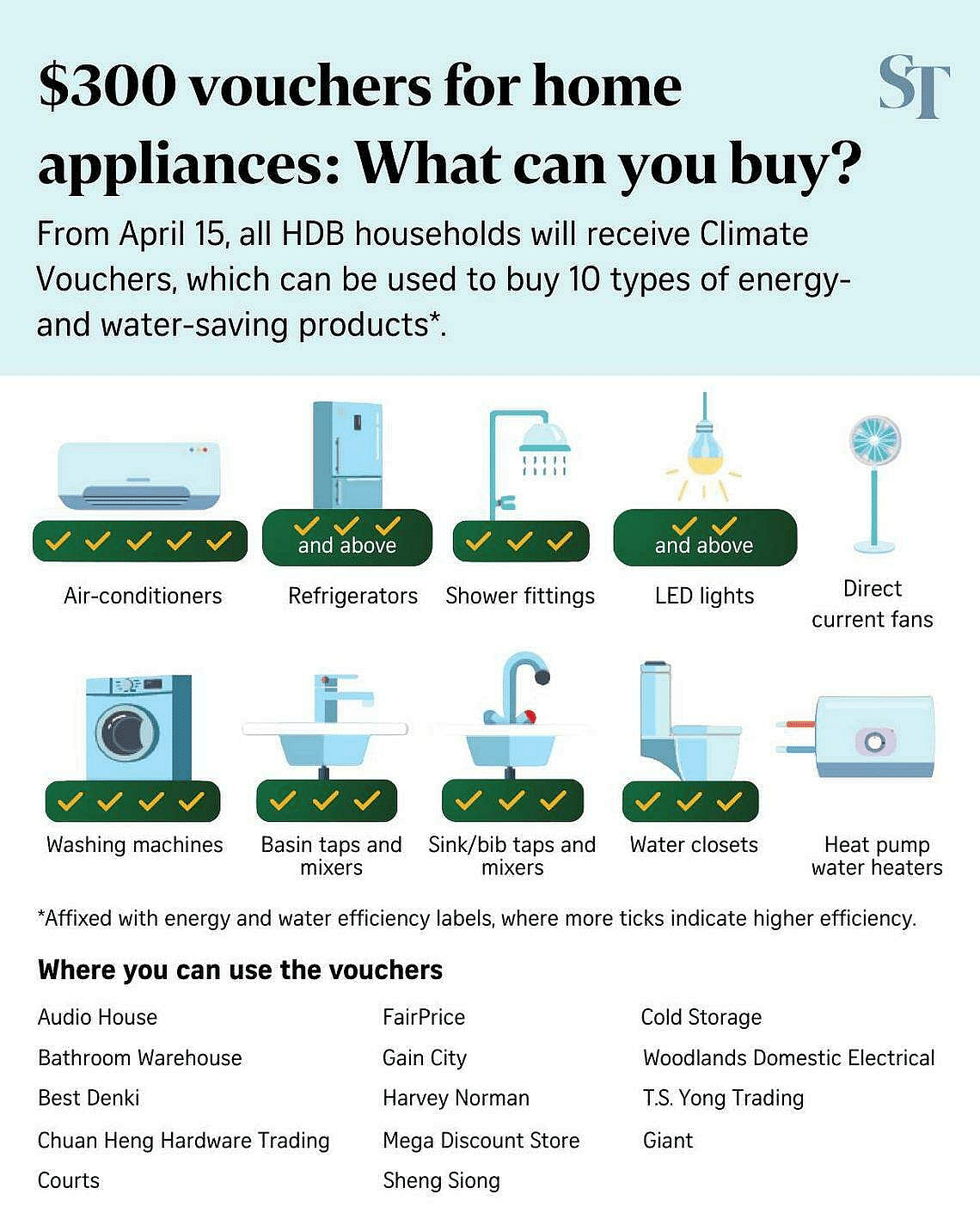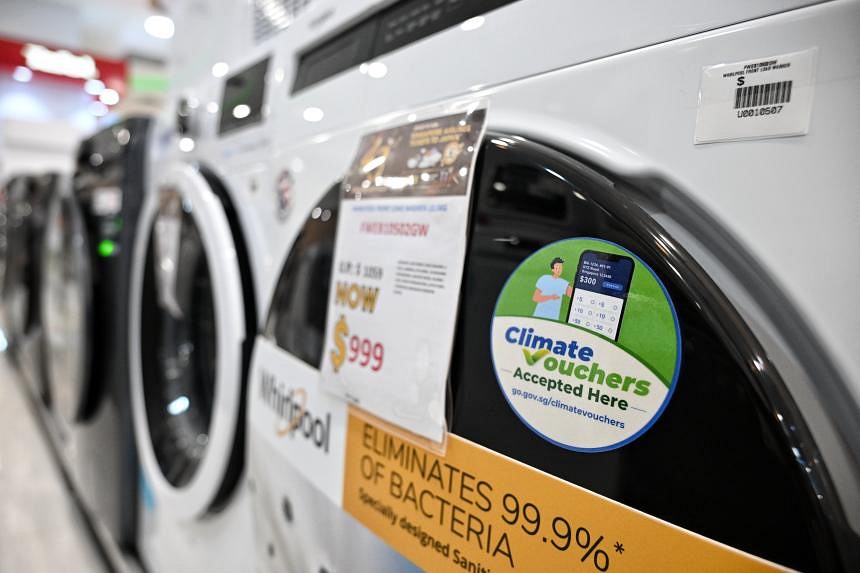SINGAPORE – In March, it was announced that all Housing Board households would receive $300 in e-vouchers that can be used to buy certain eco-friendly appliances, as part of an extension of the Climate Friendly Households Programme.
But how do consumers determine which appliances are more environmentally friendly? Simply Science looks at how you can choose devices that can help save the earth.
HDB residents can claim their climate vouchers online by logging on at RedeemSG (go.gov.sg/cv-claim) using their Singpass accounts.
The vouchers can be used at 14 participating retailers – including Courts, Best Denki, Audio House and Sheng Siong – with proof of residential address such as NRIC, utility bills or other documents.
They cover a variety of products, such as refrigerators with at least three ticks, or air-conditioners with five ticks on the National Environment Agency’s energy label, which highlights the relative energy efficiency of an appliance.
Other products include shower fittings, taps and mixers with at least three ticks under national water agency PUB’s mandatory water efficiency labelling scheme.
More information on the scheme can be found at https://www.climate-friendly-households.gov.sg/
Beyond the ticks, what else can consumers do to select more environmentally friendly appliances?
Mr Alvin Ee, a research fellow at NUS’ Energy Studies Institute, noted that energy labels also provide the annual energy consumption of an appliance, based on typical usage.
This will provide an indication of how efficient the appliance is, compared with similar appliances with the same number of ticks, he said.
Appliances eligible for the climate vouchers – such as air-conditioners, water heaters and refrigerators – are among those that consume a significant portion of energy, he added.
The use of certain technologies can also help to indicate the efficiency of an appliance.
For example, water heaters and clothes dryers using heat pumps can be more efficient than traditional electric ones, said Mr Ee.

When buying appliances, consumers should consider what they require for their day-to-day needs, he added.
For example, if a household seldom washes large loads of laundry or machine-dries clothing, they can forgo a larger washing machine or a dryer, which tends to consume more water and energy.
Instead, they can rely on laundromats when they need higher-capacity washing or drying, said Mr Ee, who also noted the option of renting home appliances when needed.
“Buying an appliance with more functions that may not be used frequently could also incur higher maintenance costs over a long period due to additional parts,” he added.
Dr Eddy Foo, a senior lecturer at NTU’s School of Electrical and Electronic Engineering, said that beyond energy consumption, other factors to consider when buying eco-friendly appliances are the water consumption of washing machines and dishwashers, and the emission of hazardous chemicals by refrigerators that can contribute to pollution.
Consumers should take into account the lifespan of an appliance, said Mr Ee, noting that appliances that last longer are less likely to be replaced, thus reducing waste.
They should also consider if the appliance is part of a take-back scheme – where retailers or manufacturers collect used items for disposal – as such companies are better able to recycle the appliances more effectively, he added.
Mr Ee advised consumers to run the appliances according to what they are designed for, for example, not installing an air-conditioner with low BTU – a unit of measurement for its cooling capacity – to cool a large space, or drying a higher load of clothing than the dryer is able to take.
“Consumers need to maintain their appliances regularly, such as cleaning or replacing filters in air-conditioners, refrigerators and dryers, as well as ensuring seals and gaskets in refrigerators are clean and intact to prevent cold-air leakage,” said Dr Foo.
They should also consider using the energy-saving or eco modes on appliances, he added.
Consumers who are environmentally conscious should note that switching to new appliances could improve energy efficiency, said Dr Foo.
Older appliances tend to consume more electricity as they have less-efficient technology, while newer appliances use new technology such as inverters – an electrical component in air-conditioners that efficiently controls motor speed and adjusts energy consumption based on user needs, he added.
“In terms of whether to buy new energy-efficient appliances, my suggestion is to perform some simple financial calculations on the energy savings and payback period,” he said.
The payback period is derived by dividing the purchase price of the appliance by the energy cost savings per year, he added.
If the payback period, or the duration for the accumulated energy cost savings to match the purchase price, is longer than 10 years – the typical lifespan of most household appliances – it may not be worthwhile to upgrade to a newer appliance, said Dr Foo.
Determining which appliances use the most energy can be difficult for the average consumer.
“In most cases, the electricity bill does not show a breakdown of the monthly consumption, so it is challenging to identify which appliance is using the most energy just by looking at the electricity bill,” said Dr Foo.
“Consumers may need to install some form of energy monitoring device to find out the energy usage of each appliance and analyse the data at the end of each month to identify appliances that use more energy,” he added.
One can also gauge the energy consumption of an appliance through the rated power usually found in the product specifications, said Mr Ee.
However, consumers should note that this is typically based on the maximum power the appliance will consume under normal operating conditions, and may not reflect the actual power consumed, he added.
- Simply Science is a new fortnightly series that looks at the science behind everyday questions.


